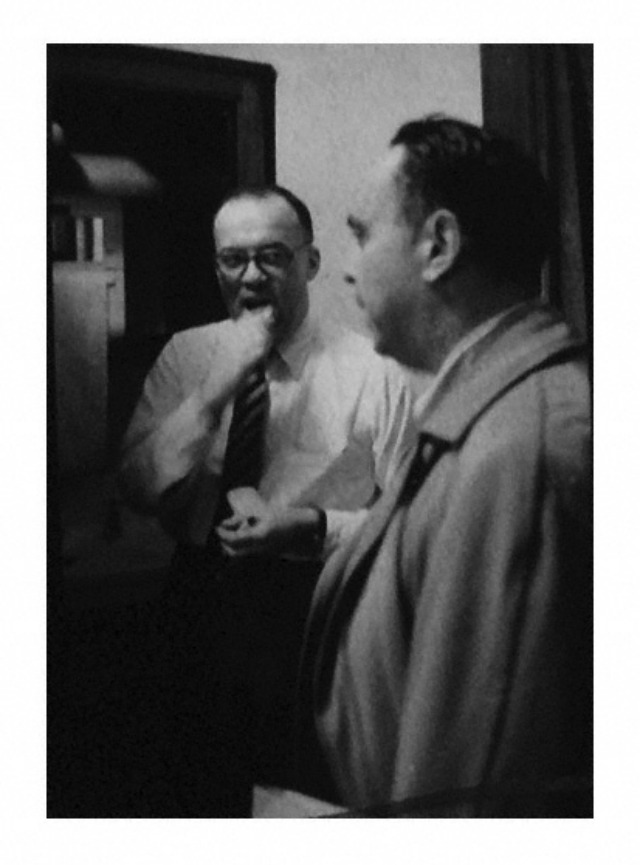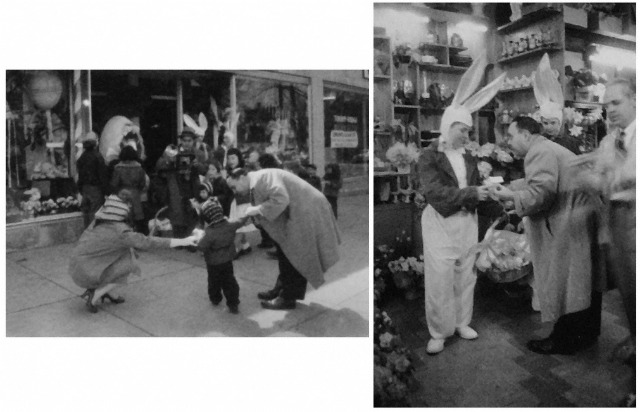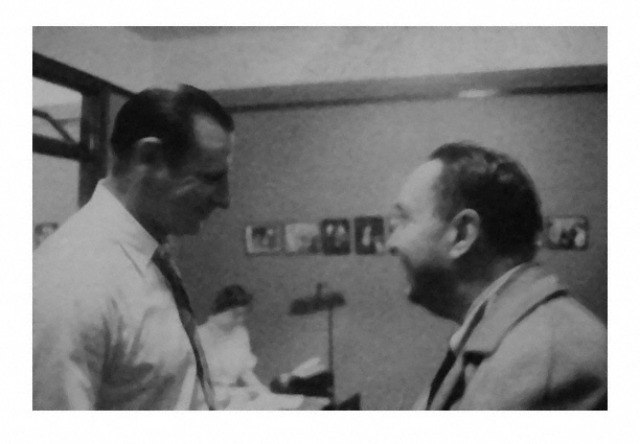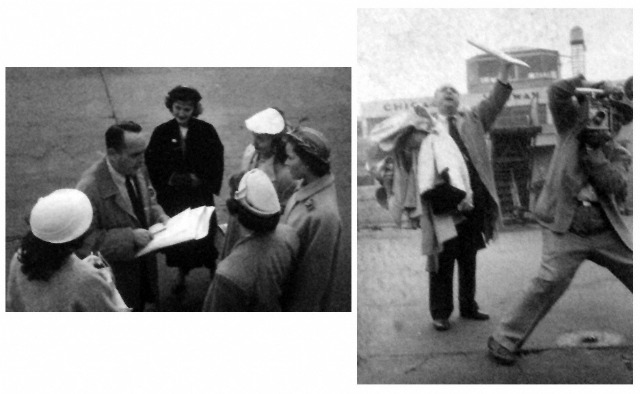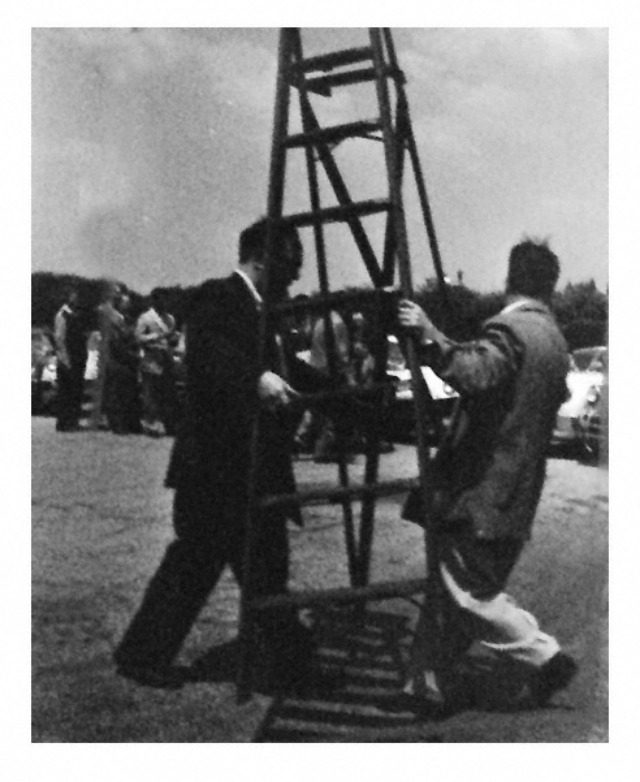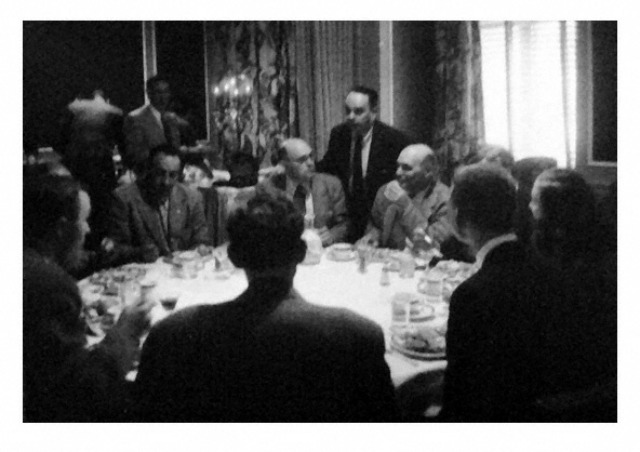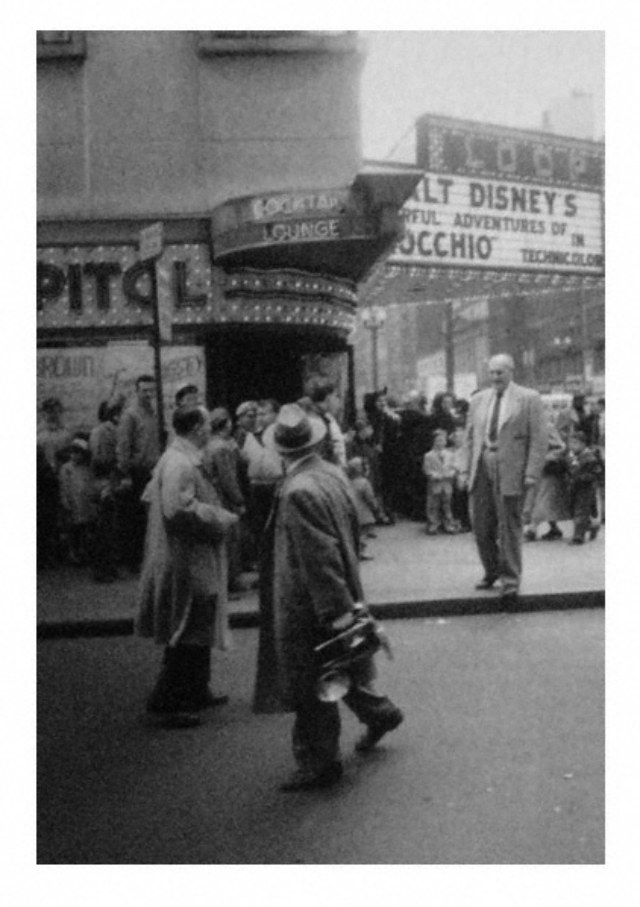From The Vault Of Art Shay: What Made Paul Montague Run?
By Art Shay in News on Jan 19, 2012 7:00PM
(Legendary Chicago-based photographer Art Shay has taken photos of kings, queens, celebrities and the common man in a 60-year career. In this week's look at his photography archives, Art tells the story of a legendary Chicago publicist.)
The first thing Elizabeth Taylor asked me as I began shooting her for Life—she was bravely plugging her late husband Mike Todd's stupid fantasy, Smell-O-Vision—was if I knew Paul Montague.
"Everybody in Chicago knows Paul Montague," I said warily.
She laughed, violet eyes piercing my soul. "That's what Mike said. Paul Montague is Chicago. You gotta meet him." Mike Todd, who was considering making a movie about Paul, said, “ he's the Sammy Glick of PR men. You know who Sammy Glick was?"
She knew Sammy's creator, screenwriter Budd Schulberg. Glick was an amalgam of all the wise-ass streetsmart kids who rose in the business world by tugging north on their bootstraps, riding on a Willy Loman smile and a shoeshine, with ethics finishing out of the moolah. The fictional Glick has become a literary stereotype. Liz spent a weekend at Schulberg's stable. I'd forgotten she was a young equestrienne in National Velvet. I had read somewhere that her co-star, Mickey Rooney, who would be married 8 times like Liz, rolled his eyes upward and panted in answer to a reporter's question: "What was the young Liz Taylor like on a date?"
I broke her up telling how I met the master and progenitor of all Chicago pitchmen, Paul Montague pitching my friend, the literary editor Herman Kogan, as Herman brushed his teeth. (See the first picture.) It was in the Sun-Times building. Herman (who felt I was wasting my time behind the camera and should be at home writing my own Catch 22 about the war I had just survived) would load me up with books to review. We'd dump them in my car and have lunch. Herman's admiration by Marshall Field IV (he had written Give the Lady What She Wants about Marshall Field's department store) had garnered him an old-fashioned wooden three-foot by eight-foot washroom in his office with running water and—as he emerged from it, white-foaming toothpaste on his hard working brush—there was this hand-flapping seal of a 45-year-old press agent touting a Carol Channing show opening in a week. That press agent was none other than Paul Montague. Herman introduced us speaking in a white blur. "I was meaning to call you on several ideas for Life" Montague pitched me as Herman rinsed, jotting down my phone number. He recognized me as a ticket to ride.
He evoked Carol Channing by capsizing then swiftly batting his eyes (his Carol simulacrum) and told a fast falsetto dirty joke in which "her"punchline was, "So I fucked the three of them and with that out of the way we had lunch at Riccardo's." "She paused," Montague averred dramatically, "and layed on a badump-bump finish: “The lunch was better."
"I heard her tell this very joke four different ways," Liz muttered. Someone handed her a martini and she paid him with a thumb up for having done a good deed. "Carol!"
Paul's weakness was for Henny Youngman shtick. It would, eventually, cost him (and me) a great story in Life— some $200,000 in free space I figured, easily a million in today's market. Like Youngman, Paul treated all goyim as waiting to be galvanized into Yiddish hipness by a dirty Jewish joke or two. Like the hard luck Jew who's had the classic bad day— getting fired; wallet left in cab; wife screwing the mailman;-now here he is in a bar having a last drink before ending it all with a little poison pill— when this tough biker grabs the drink and downs it, mocking his plight after hearing his day's adventures, ending with, "So now that you've taken my pill I can't even kill myself." Like that.
Kogan had finished rinsing and, as Paul left to chepper drama critic Glenna Syse and the all-powerful Irv Kupcinet in nearby offices, Herman and I escaped with our books. Nelson Algren would sometimes meet us at a Merchandise Mart restaurant across the river and regale us with his own rundown of a lousy or felicitous day. "I just met the girl of my dreams-naked except for her fur coat, dress and underwear— real classy Winnetka underwear. Trouble was, I was dreamin'" Nelson was always meeting willing suburban women. Years later I was sitting with Kogan at a funeral service for a dead Roman number enumerated Marshall Field, when a wild-haired, fairly famous poet came up to me. "You knew Nelson was fucking my wife that summer we had a room in his apartment," he j'accused me in a harsh whisper. I whispered back an equally vehement denial: " So what, Nelson was fucking everybody's wife."
"That's the kinda stuff your Catch 22 should have!" Kogan muttered. Herman was a great cheerleader. He cheered Studs Terkel to continue his WFMT series of interviews and his own son Rick Kogan into becoming a first class Chicago Tribune writer and radio man.
"Carol and Lucille Ball," Liz said, "were the greatest joke-tellers at parties, "I think she upped the number of guys in the joke to five eventually." At any rate, I became the only photographer permitted to shoot her in the Pump Room. A phone fix by Montague. Like all Sammy Glicks, he knew how to ride a possible story into an account.
The 50s were the sleaziest of times since the 20s. (And of course Now, thanks largely to politics and banking.) The war had made everything permissible and buyable. The moral changes were first wrought by the automobile. Anyone could travel to the next town's hotel with anyone's wife for an afternoon of sin. But the pace of immorality and commerce picked up when the big time trains started crossing the country in three to four days. The airplane hadn't quite become civilian-ized. The factories were busy converting war planes and mid-air fuelers to round-the-clock dependable air transportation.
Paul Montague became a master at filling these stops with interviews and plugs. Once, the influential columnist Sydney Harris, acting on a Montague tip, appeared in the ante-room of a famous actress's suite at the Ambassador East Hotel. To save time he had discarded his suit and was down to shoes, high socks, garters and underwear- when the star appeared with her visiting aunt- and she chased Sydney into the lobby with her aunt's umbrella. Sometimes even the greatest of us missed fine pre-paparazzi images by being occupied elsewhere than where the real action was going on.
Movie stars and sports figures still used the railroads and their posh sleepers. And everyone became used to the four hour delay in Chicago between when you arrived from LA and when you started for NY. (Or vice versa.) It was, as I implied, Paul Montague who turned these four hours into gold for unknown starlets and sinking stars. For a flat fee of $50 and up—most of the time—he would score interview after interview for the movie companies looking for free print in Chicago. Especially for turkeys that had cost the studio a bundle. He could always arrange in any of six hotels, for a comp room in which an interview might take place. The west coast PR teams knew that Montague had the Chicago press in his pocket. Hadn't they entrusted movie premieres like Gary Cooper's in "Friendly Persuasion" and (as proudly noted by his daughter Lois Montague in his 1998 obit; he died at 91.) "Around the World in 80 Days."
Re-reading the above I see my enthusiasm for "the Montague" story as a Life project impelled me to follow him around for a week or so before they sent me their idea of a shooting "script". Precipitating my thrusting Montague on you is that, like Sammy Glick, Paul Montague was sui generis, a surviving warrior of strange battlements, in some ways as strange as those in Avatar. He was the last of the old time press agents; road tour drumbeaters; advance men for touring Broadway and not so Broadway shows and circuses, for dispensers of all the kinds of snake oil-selling that preceded the net by two or three generations.
The clan included likable conmen like my Uncle Murray, who sold magazine subscriptions to doctors and dentists up and down the east coast: traveling by bus; mindful, like Willy Loman, of the necessity of being nice to secretaries; of keeping his wingtips clean and his fedora spotless; masters all of the mechanics of the sell; of what it took to cash in on the attention paid to him.
I hadn't, truth to tell, thought of Paul Montague for years until the other week when I regaled you with my memories of PR giant Dan Edelman and his 50 foreign offices and 3,500 employees. But it was a passing thought, like whatever happened to that pitcher who went to your high school and aspired to the majors. But then, with a smile, my assistant Erica brought me what Life had returned of my Montague story that he had bolluxed up after it was laid out as a four page Life essay...negatives, contact prints and all.
The pictures that follow were all copied by Erica on her little digital Canon: not as clear as Life prints would be from the negatives, but clear enough for you to meet the man.
My good friend Ralph Graves, a great journalist, minor novelist and receiver of my Lincoln Park touch-football passes Sunday after Sunday, was Life's Bureau Chief in Chicago. He liked my pitch on Montague and wanted to meet him. Fortuitously, Paul was plugging an Olsen &Johnson laff riot at the Mike Todd Theater, so Ralph and his wife Pat, my wife Florence and I, met Paul in the lobby half an hour before showtime.
I had warned Montague that Graves would not be receptive to dirty Jewish jokes, lewd showbiz asides, or humor about divorce, having just gone through an expensive one. So what was Paul's opening line? A dirty Jewish joke about a divorce... it didn't go over.
After five pre-curtain minutes, Graves took me aside."He's likable, of course," Graves said gravely."But I don't think we should impose this man on Life readers. Do you?" And with that, we entered Mike Todd's own box with his new wife to laugh at Hellzapoppin'.
If you can't wait until this time every Wednesday to get your Art Shay fix, please check out the photographer's blog, which is updated regularly. Art Shay's book, Chicago’s Nelson Algren, is also available at Amazon.
